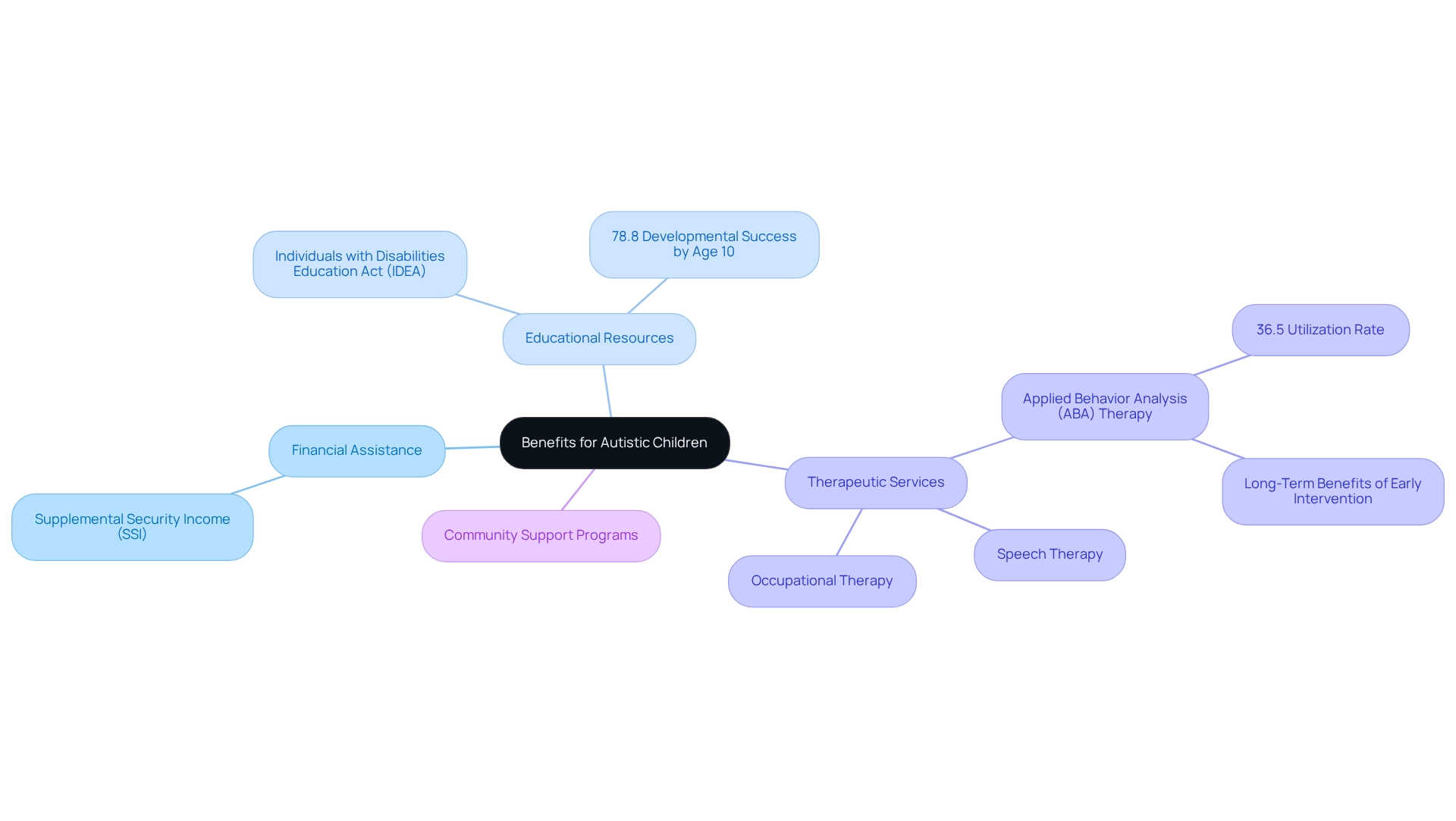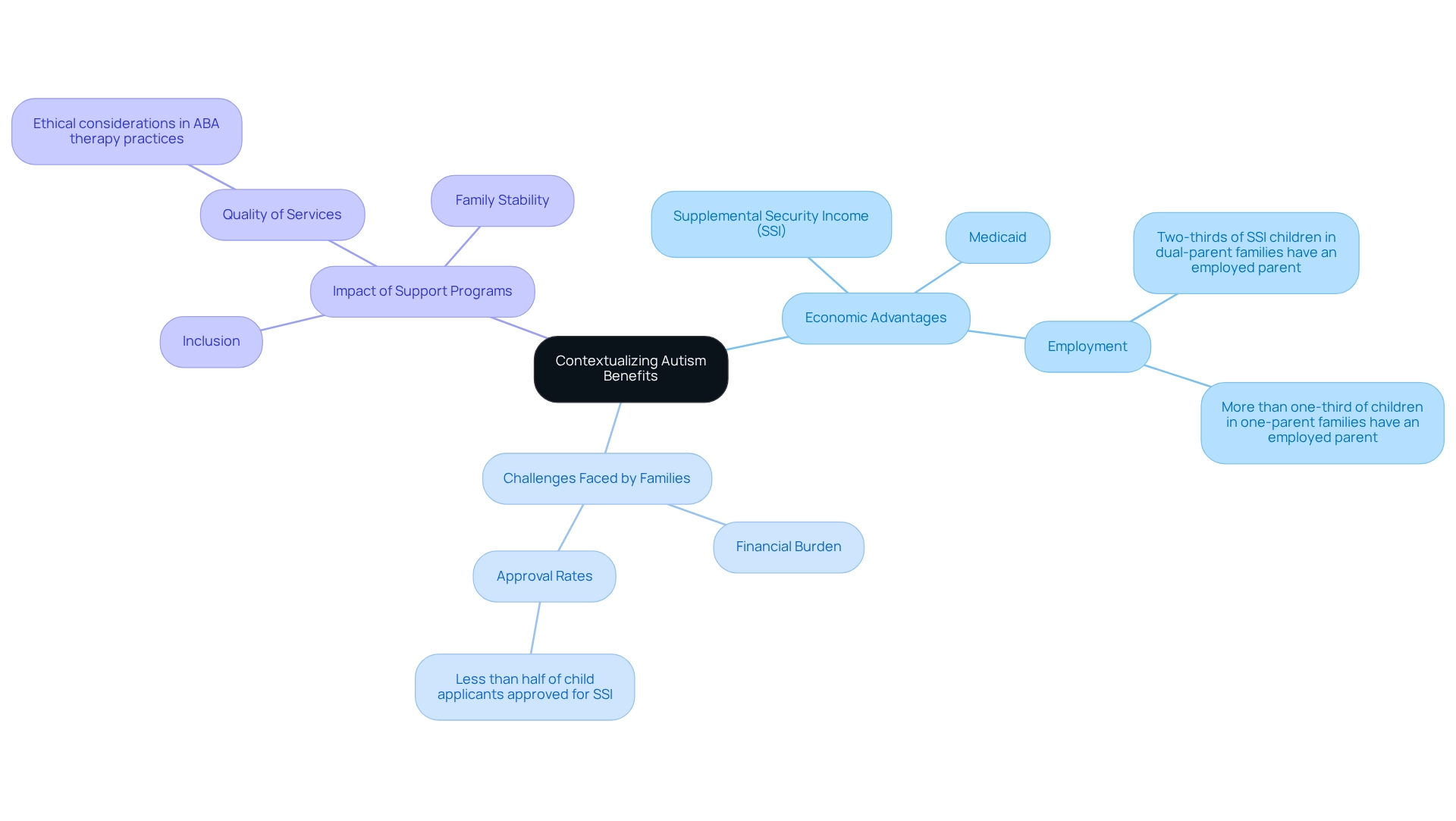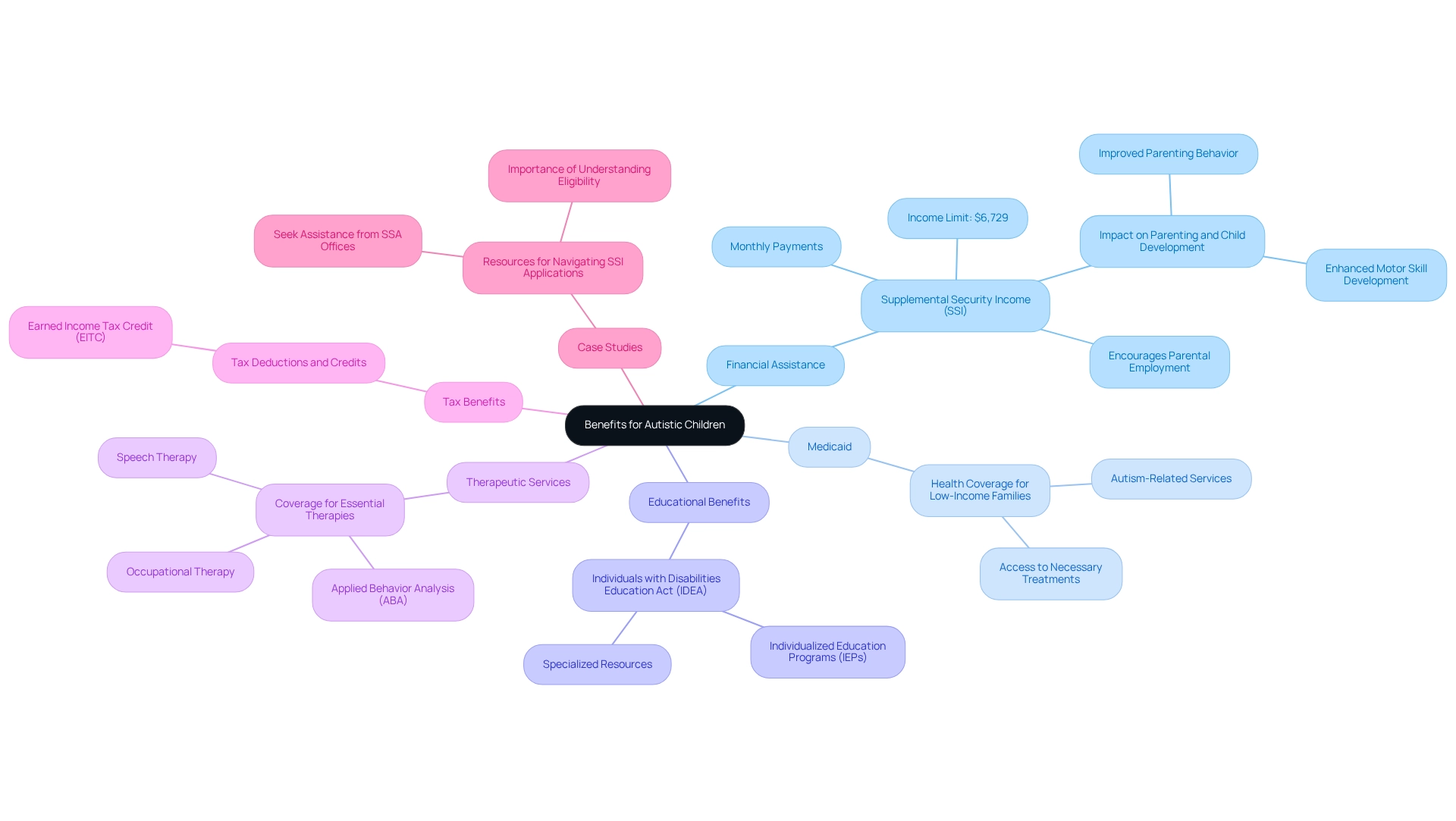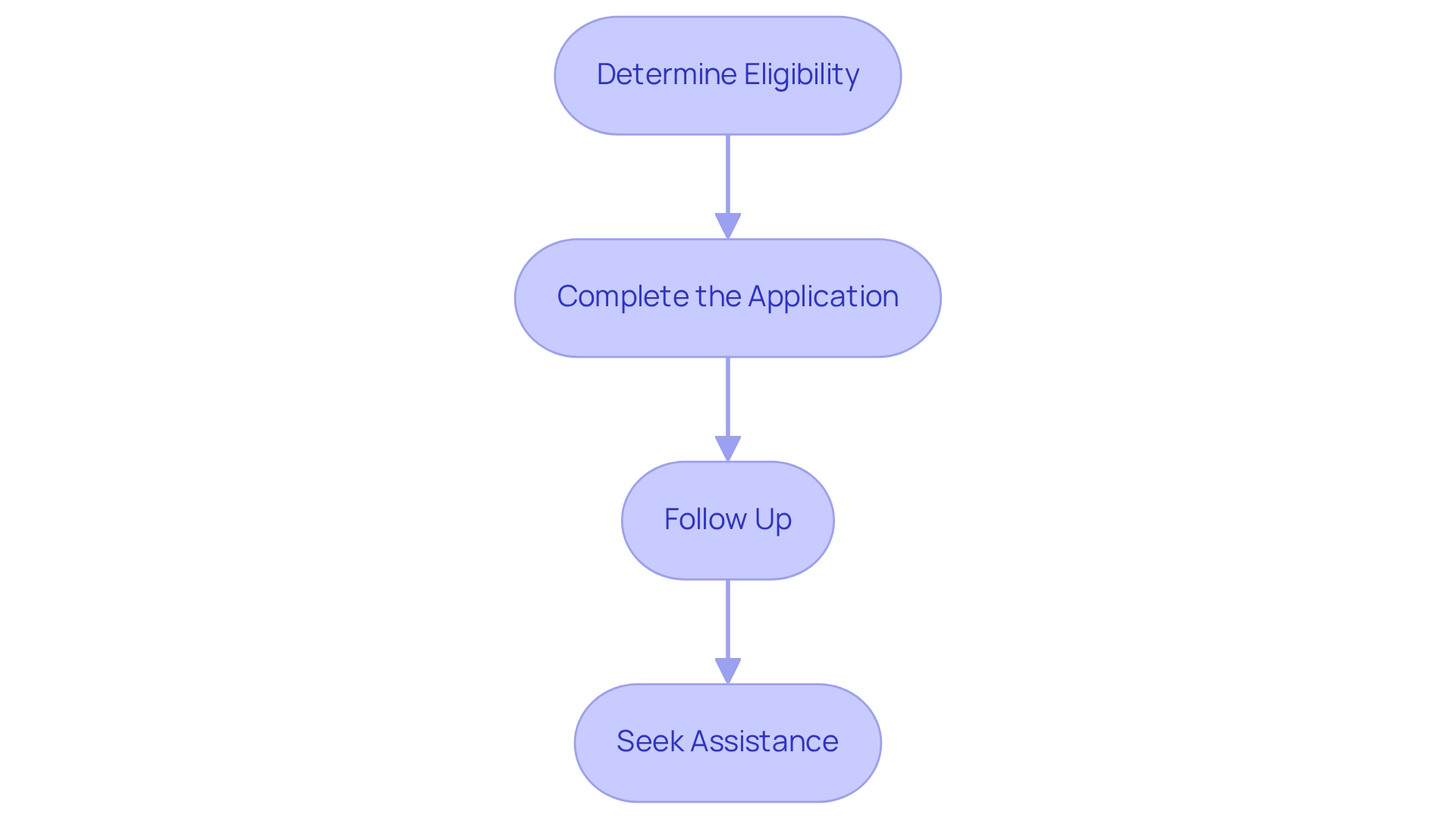Overview
This article highlights the various types of benefits available for autistic children, such as:
- Financial assistance
- Educational resources
- Therapeutic services
- Community support programs
These initiatives aim to significantly improve their quality of life. Understanding the financial burdens families face, it emphasizes how these benefits can alleviate stress and facilitate access to essential services. By fostering inclusion and enhancing developmental outcomes for autistic individuals and their families, we can create a more supportive environment. If you’re a parent navigating these challenges, know that you are not alone. Explore these resources and consider how they can make a positive difference in your child's life.
Introduction
In a world where the needs of autistic children are increasingly recognized, it is essential to understand the array of benefits available to support their development and well-being. Financial assistance, such as Supplemental Security Income (SSI), and specialized educational resources mandated by the Individuals with Disabilities Education Act (IDEA) play pivotal roles in enhancing the quality of life for families navigating the complexities of autism. Furthermore, therapeutic services, community support, and tax incentives contribute to a comprehensive support system designed to empower both children and their caregivers.
As families strive to access these crucial resources, a clear understanding of eligibility and application processes can make all the difference in securing the support needed for a brighter future. Have you ever felt overwhelmed by the options available? You're not alone. Many parents share this journey, and together we can explore the pathways to ensure that every child receives the support they deserve.
Defining Benefits for Autistic Children
The benefits for autistic child encompass a wide range of assistance designed to meet their unique needs and enhance their overall quality of life. These advantages, which include financial assistance, educational resources, therapeutic services, and community support programs, also provide significant benefits for autistic child. For families with low income, financial assistance, such as Supplemental Security Income (SSI), provides crucial monthly payments, significantly impacting their ability to access necessary services. The educational benefits for autistic child, mandated by the Individuals with Disabilities Education Act (IDEA), ensure that young individuals receive tailored support. Remarkably, 78.8% of school-age autistic youth thrive in at least one developmental area by age 10.
Therapeutic services play a vital role in skill development and overall functioning, often providing benefits for autistic child by granting access to Applied Behavior Analysis (ABA) therapy, speech therapy, and occupational therapy. Surveys reveal that 36.5% of autism caregivers utilize ABA therapy, with many reporting positive outcomes. Research highlights the long-term benefits for autistic child of early ABA intervention, demonstrating that individuals who start therapy at a young age experience significant improvements in cognitive abilities, language skills, and adaptive behaviors compared to their peers. A case study titled 'Long-Term Benefits for Autistic Child of Early ABA Intervention' illustrates that these early interventions yield substantial benefits, reinforcing the importance of timely access to therapeutic services.
As we look toward 2025, the landscape of support for autistic individuals is continually evolving, with recent initiatives focused on enhancing accessibility to essential services. Understanding the typical expenses associated with common autism services in the U.S. can assist households in managing the economic aspects of obtaining therapy. Expert assessments underscore the critical importance of support in improving the quality of life for autistic individuals, as these resources provide significant benefits for autistic child and highlight the ongoing need for assistance for families facing these challenges.

Contextualizing Autism Benefits: Importance and Impact
The significance of economic advantages for autistic individuals cannot be overstated, as many households encounter substantial financial challenges stemming from autism-related therapies, medical expenses, and educational support. Programs like Supplemental Security Income (SSI) and Medicaid play a crucial role, offering essential assistance that enables families to access vital services without the burden of overwhelming debt.
Alarmingly, statistics reveal that fewer than half of young applicants are approved for SSI, highlighting the hurdles many families face in securing these supports. Furthermore, professional insights indicate that two-thirds of children in dual-parent households have an employed parent, underscoring the economic strains that even working families experience. These advantages not only alleviate financial pressure but also fulfill an essential role in fostering inclusion and equal opportunities, providing significant benefits for autistic children. By providing access to necessary services, they empower young individuals and ensure benefits for autistic children to fully participate in educational and social activities. The impact of SSI and Medicaid extends beyond mere financial assistance; they cultivate a sense of safety and stability within families, allowing them to concentrate on their children's development and overall well-being.
Moreover, the ethical implications of ABA therapy practices are vital, as financial resources can significantly influence the quality and availability of these services. Over time, various organizations and state initiatives have emerged to enhance support for youth with disabilities and their families, offering resources and advocacy to help families navigate the complexities of financial aid. These initiatives are crucial in addressing the financial challenges faced by households with autistic individuals, ensuring they have the necessary resources and knowledge to thrive. The role of Medicaid, in particular, is indispensable, as it provides comprehensive coverage for essential therapies and services, further enriching the support landscape for families.

Types of Benefits Available for Autistic Children
Families with autistic children have access to benefits for autistic child that are designed to support their unique needs. Understanding these resources can make a significant difference in navigating the challenges they face. Here are some key benefits available:
- Financial Assistance: Programs like Supplemental Security Income (SSI) provide monthly payments to low-income households, helping cover living expenses and therapy costs. Notably, the SSI framework encourages parental employment, as only half of parental earnings are considered against a dependent's SSI support. This allows families to maintain financial stability while receiving aid. To qualify for SSI benefits, a parent must have a gross monthly income of no more than $6,729 for one parent with one dependent who does not meet eligibility. Kathleen Romig, a Federal Budget Analyst, notes that mothers whose children qualify for SSI often work fewer hours, leading to significant improvements in both their parenting behavior and their children's motor skill development.
- Medicaid: This essential program offers health coverage for low-income families, encompassing a variety of autism-related services, including therapy and medical care. Current statistics reveal that Medicaid plays a crucial role in ensuring access to necessary treatments for autistic individuals, providing the support they need to thrive.
- Educational Benefits: Under the Individuals with Disabilities Education Act (IDEA), individuals with autism are entitled to specialized education services tailored to their unique needs. This includes individualized education programs (IEPs) and access to specialized resources, which are vital for their academic and social development.
- Therapeutic Services: Many states offer programs that cover the costs of essential therapies, such as Applied Behavior Analysis (ABA), speech therapy, and occupational therapy. These services are crucial for skill development and enhancing the quality of life for individuals with autism.
- Tax Benefits: Families may qualify for various tax deductions or credits related to medical expenses and care for their autistic child, including the Earned Income Tax Credit (EITC) for working parents. These financial incentives can provide substantial support, helping households manage the expenses associated with autism care more effectively.
- Case Studies: Families are encouraged to seek assistance from SSA offices when applying for SSI support, as the process can be complex. The case study titled "Resources for Navigating SSI Applications" highlights the importance of understanding eligibility criteria and maximizing chances of approval.
By comprehending and utilizing these advantages, families can more effectively navigate the complexities of support available for benefits for autistic child. Sharing experiences and insights can foster a community of understanding and support, so consider reaching out to others who are on a similar journey.

Navigating Eligibility and Application Processes for Benefits
Navigating the eligibility and application processes for assistance can feel overwhelming, but understanding the steps involved can make the journey smoother for families.
- Determine Eligibility: Start by evaluating if your child meets the requirements for assistance, such as SSI or Medicaid. This often involves gathering medical records and demonstrating the individual's functional limitations. It's important to note that in some states, the determination rates for assistance have fluctuated significantly. For instance, areas like Minnesota and North Dakota saw declines of at least 33% from 2004 to 2013, while states like Utah and Texas experienced increases of 32%, and Connecticut saw a rise of 31%. These trends underscore the importance of being aware of local variations and gathering necessary documentation, such as medical records, proof of income, and previous assessments, to access benefits for autistic child. Commonly required documentation for autism assistance applications often consists of detailed evaluations from healthcare providers and educational assessments.
- Complete the Application: Applications can usually be submitted online or in person at local Social Security offices. It is crucial to fill out all forms accurately and completely to avoid delays. Families should also be aware that differences in the SSI program's implementation across states can impact the application process, highlighting the need for thoroughness and standardized measures in assessing disabilities.
- Follow Up: After submitting your application, it’s advisable to follow up to check the status and provide any additional information requested by the agency. Staying proactive can help ensure that applications are processed in a timely manner.
- Seek Assistance: Many organizations and advocacy groups, including the Autism Society and local disability rights organizations, offer support in navigating the application process. They provide valuable resources and guidance to help ensure individuals can access the benefits they need. Engaging with these resources can significantly enhance the likelihood of a successful application, especially considering recent recommendations for more consistent SSI implementation that provides benefits for autistic child and aims at improving long-term mental health outcomes for children. Understanding the eligibility and application processes is a vital part of the comprehensive support system available to families.

Conclusion
Accessing the array of benefits available for autistic children is crucial for enhancing their quality of life and supporting their unique needs. From financial assistance programs like Supplemental Security Income (SSI) to specialized educational resources mandated by the Individuals with Disabilities Education Act (IDEA), families have access to essential tools that can profoundly influence their child's development. Therapeutic services, community support, and tax incentives further contribute to a robust support network that empowers both children and their caregivers.
However, navigating the complexities of eligibility and application processes can feel overwhelming for many families. A clear understanding of these processes, along with the necessary documentation and support from advocacy organizations, can simplify access to critical resources. By being informed and proactive, families can better position themselves to secure the assistance they need.
Ultimately, the collective impact of these benefits not only alleviates financial burdens but also fosters inclusion and equal opportunities for autistic children. As the landscape of support continues to evolve, it remains essential for families to stay informed about available resources and advocate for their child's rights. Together, these efforts contribute to creating a brighter future for children with autism and their families, ensuring they receive the support they truly deserve.
Frequently Asked Questions
What are the main benefits available for autistic children?
The main benefits for autistic children include financial assistance, educational resources, therapeutic services, and community support programs, all designed to meet their unique needs and enhance their overall quality of life.
How does financial assistance help families with autistic children?
Financial assistance, such as Supplemental Security Income (SSI), provides crucial monthly payments for low-income families, significantly impacting their ability to access necessary services for their autistic children.
What educational benefits do autistic children receive?
Educational benefits for autistic children, mandated by the Individuals with Disabilities Education Act (IDEA), ensure that they receive tailored support, with 78.8% of school-age autistic youth thriving in at least one developmental area by age 10.
What types of therapeutic services are beneficial for autistic children?
Therapeutic services that benefit autistic children include Applied Behavior Analysis (ABA) therapy, speech therapy, and occupational therapy, which play a vital role in skill development and overall functioning.
What is the prevalence of ABA therapy usage among autism caregivers?
Surveys indicate that 36.5% of autism caregivers utilize ABA therapy, and many report positive outcomes from this type of intervention.
What are the long-term benefits of early ABA intervention for autistic children?
Research shows that individuals who start ABA therapy at a young age experience significant improvements in cognitive abilities, language skills, and adaptive behaviors compared to their peers.
How is the support landscape for autistic individuals expected to evolve by 2025?
The landscape of support for autistic individuals is continually evolving, with recent initiatives focused on enhancing accessibility to essential services.
Why is understanding the expenses associated with autism services important for families?
Understanding the typical expenses associated with common autism services can assist households in managing the economic aspects of obtaining therapy, which is critical for improving the quality of life for autistic individuals.




